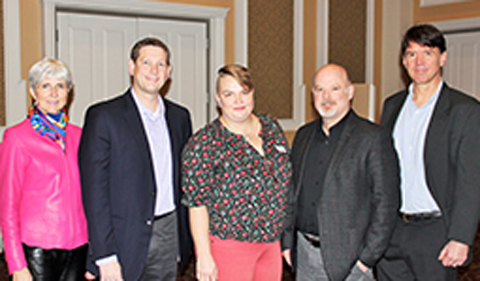Excerpted from Compass

Ohio University Vice Provost for Global Affairs and International Studies Lorna Jean Edmonds is shown with panelists (from left) Lance Healy, Anastasia Karpoukhina and Maua Fulton, and Communication and Development Studies Director Lawrence Wood.
Students who are planning for their careers need to be open to new, and sometimes unusual, opportunities that could come up at any time, said Ohio University alumni at “Getting a Job: The Global Professional in Today’s World.”
The event that was held as part of the Global Professional Development Series during Ohio University’s International Education Week.
“Take risks, or more simply say yes to possibilities,” said Patrick Murphy, associate dean for research and graduate studies and associate professor in the Department of Media Studies and Production at Temple University. Murphy served as the Keynote Speaker for the Nov. 17 event, which also featured:
- Lance Healy ’95, chief innovation officer for Banyan Technology
- Maura Fulton ’99, country director for the Peace Corps Myanmar
- Anastasia Karpoukhina ’16, disaster program manager for the Red Cross, CT and RI Regions
Healy earned two bachelor’s degrees, one in French and one in International Studies-Africa, from the College of Arts & Sciences.
Fulton earned an M.A. in Development Studies from the Center for International Studies and a Graduate Certificate in Women’s Studies from the College of Arts & Sciences.
Karpoukhina earned an M.A. in Development Studies and a certificate in War and Peace Studies from the Center for International Studies and graduate certificates in Environmental Studies and Women’s, Gender & Sexuality Studies from the College of Arts & Sciences.
“To follow the brushstroke is very important,” Karpoukhina said. She knew, for example, that she wanted to work in a career where she could travel and help people, and that led her to sign up for the Peace Corps.
“It’s really where I found what I wanted to do,” she said. Today, she works for the Red Cross and is gaining experience and knowledge that will help her as she moves through her career.
“Patience is important,” she added. Karpoukhina also told the students to be flexible in their careers and to work toward jobs that fit with their passions.
“Look at different jobs that can get you to the job you want,” she added.
Healy explained in his remarks that he has worked in several positions in his career that fit with his passion for international work. Each job and experience led into a new position that continued to “follow the brush.”
“People will tell you why things won’t work, but if you have passion for what you are doing and what you want to do, you will get there,” Healy said. “Keep going forward.”
Fulton, who addressed the group via Skype, explained that her career started with her volunteer experience in the Peace Corps.
“It was very life changing and I knew after that, that I wanted to get a degree in international development,” she said. Fulton was drawn to the Ohio University program where she learned from former director Professor Robert Walter.
“He has just been a steadfast mentor and champion,” Fulton said. She is thankful that she took the opportunity to study at Ohio University, and she encouraged the audience members to take on new experiences, be open to new opportunities and to get out of their comfort zones.
“Say yes to those opportunities, even if it’s not the perfect place with the best salary. The most important thing is the passion for the work,” Fulton said
Murphy also offered a few final tips for students and audience members during the panel discussion.
“Learn how to write well, you can use that in pretty much any job,” Murphy said.
“If you don’t speak a second language, start tomorrow,” he added. Learning a second language is useful in communicating, but also in understanding how people may think differently.
“Learn how to do research and apply research to whatever you’re doing,” he said. For research projects and presentations that the students are doing here at Ohio University, Murphy encouraged the students to treat them as professional projects that they can use in their portfolios when they are applying for work.
A video of the keynote speech and panel discussion is available here.



















Comments